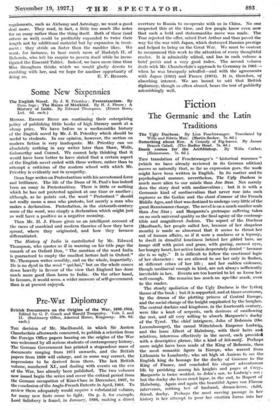Pre-War Diplomacy
Tim decision of Mr. MacDonald, in. which Sir Austen Chamberlain afterwards concurred, to publish a selection from the Foreign Office papers bearing on the origins of the War was welcomed by all serious students of contemporary history. The German Government has printed a stupendous mass of documents ranging from 1871 onwards, and the British papers from 1898 will enlarge, and in some way correct, the impressions to be derived from them. The last British volume, numbered XI., and dealing with events on the eve of the War, has already been published. The two volumes
now issued begin the series and cover the critical period from the German occupation of Kiao-Chau in December, 1897, to
the conclusion of the Anglo-French Entente in April, 1904. To review them adequately would require a substantial volume, for many new facts come to light. On p. 5, for example, Lord Salisbury is found, in January, 1898, making a direct
overture to Russia to co-operate with us in China. No one suspected this at the time, and few people know even now that such a bold and statesmanlike move was made. The Tsar rejected the offer, seized Port Arthur and thus paved the way for the war with Japan, which destroyed Russian prestige and helped to bring on the Great War. We must be content to recommend this work to the attention of every thoughtful reader. It is admirably edited, and has in each volume a brief précis and a very good index. The second volume deals with Mr. Chamberlain's approach to Germany in 1901— when he was brusquely rebuffed—and with the agreements with Japan (1902) and France (1904). It is, therefore, of absorbing interest. We are bound to add that British diplomacy, though so often abused, bears the test of publicity astonishingly well.














































 Previous page
Previous page